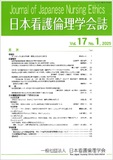Japanese
English
- 販売していません
- Abstract 文献概要
- 参考文献 Reference
日本の保健医療の場における社会正義と解放に向けての専門看護師の実践を記述することを目的とした。資格取得後3年以上の実践経験を有する専門看護師14名へのインタビューのデータをもとに事例を作成し、分析した。結果、日本の保健医療の場における社会正義の問題として1)偏見や差別、役割と文化的規範、2)資源の偏在、制度や組織のはざま、3)医療の組織とイデオロギー、4)看護実践を支配するパースペクティブ、信念や価値が明らかになった。また専門看護師により人々の解放や擁護、組織や社会の変革に向けた実践が行われており、そこでは共に取り組む、二項対立ではなく関係性を意識する、言葉で説得する、モデルとなって実践するなど、優れた実践の基盤に基づくアプローチが用いられていた。今後の課題として人々の健康と提供されるケアに影響を及ぼす社会政治的要因の明確化、その知見を適切に共有し、改善していくアプローチの探究が示唆された。
The purpose of this study was to describe the practice of CNS toward social justice and emancipation in the Japanese health care setting. Case studies were developed based on data from interviews with 14 CNSs with at least three years of post-licensure practice experience and analyzed from an emic and etic perspective. The results revealed social justice issues in the Japanese healthcare setting, including 1)prejudice and discrimination, roles and cultural norms, 2)uneven distribution of resources, and institutional and organizational divides, 3)organization and ideology of healthcare, and 4)perspectives, beliefs and values that govern nursing practice. In addition, professional nurses were practicing to emancipate and advocate for people, and to transform organizations and society, using approaches such as working together, being aware of relationships rather than dichotomies, persuading with language, and modeling and practicing. Future work was suggested to further clarify the sociopolitical factors influencing people's health and the care provided, and to explore approaches to appropriately share and improve the findings.
Copyright © 2025, The Japan Nursing Ethics Associatin. All rights reserved.


